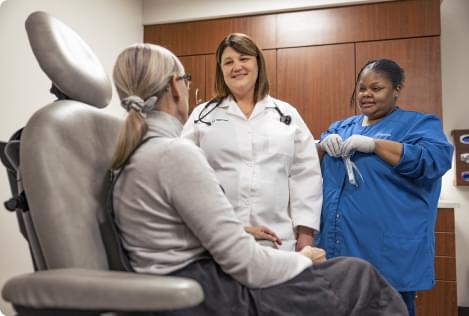Overview
Hashimoto's disease is an autoimmune disorder affecting the thyroid gland. The thyroid is a butterfly-shaped gland located at the base of the neck just below the Adam's apple. The thyroid produces hormones that help regulate many functions in the body.
An autoimmune disorder is an illness caused by the immune system attacking healthy tissues. In Hashimoto's disease, immune-system cells lead to the death of the thyroid's hormone-producing cells. The disease usually results in a decline in hormone production (hypothyroidism).
Although anyone can develop Hashimoto's disease, it's most common among middle-aged women. The primary treatment is thyroid hormone replacement.
Hashimoto's disease is also known as Hashimoto's thyroiditis, chronic lymphocytic thyroiditis and chronic autoimmune thyroiditis.

Symptoms
Hashimoto's disease progresses slowly over the years. You may not notice signs or symptoms of the disease. Eventually, the decline in thyroid hormone production can result in any of the following:
- Fatigue and sluggishness
- Increased sensitivity to cold
- Increased sleepiness
- Dry skin
- Constipation
- Muscle weakness
- Muscle aches, tenderness and stiffness
- Joint pain and stiffness
- Irregular or excessive menstrual bleeding
- Depression
- Problems with memory or concentration
- Swelling of the thyroid (goiter)
- A puffy face
- Brittle nails
- Hair loss
- Enlargement of the tongue
When to see a doctor
Signs and symptoms of Hashimoto's disease vary widely and are not specific to the disorder. Because these symptoms could result from any number of disorders, it's important to see your health care provider as soon as possible for a timely and accurate diagnosis.
Causes
Hashimoto's disease is an autoimmune disorder. The immune system creates antibodies that attack thyroid cells as if they were bacteria, viruses or some other foreign body. The immune system wrongly enlists disease-fighting agents that damage cells and lead to cell death.
What causes the immune system to attack thyroid cells is not clear. The onset of disease may be related to:
- Genetic factors
- Environmental triggers, such as infection, stress or radiation exposure
- Interactions between environmental and genetic factors
Risk factors
The following factors are associated with an increased risk of Hashimoto's disease:
- Sex. Women are much more likely to get Hashimoto's disease.
- Age. Hashimoto's disease can occur at any age but more commonly occurs during middle age.
- Other autoimmune disease. Having another autoimmune disease — such as rheumatoid arthritis, type 1 diabetes or lupus — increases your risk of developing Hashimoto's disease.
- Genetics and family history. You're at higher risk for Hashimoto's disease if others in your family have thyroid disorders or other autoimmune diseases.
- Pregnancy. Typical changes in immune function during pregnancy may be a factor in Hashimoto's disease that begins after pregnancy.
- Excessive iodine intake. Too much iodine in the diet may function as a trigger among people already at risk for Hashimoto's disease.
- Radiation exposure. People exposed to excessive levels of environmental radiation are more prone to Hashimoto's disease.
Complications
Thyroid hormones are essential for the healthy function of many body systems. Therefore, when Hashimoto's disease and hypothyroidism are left untreated, many complications can occur. These include:
- Goiter. A goiter is enlargement of the thyroid. As thyroid hormone production declines due to Hashimoto's disease, the thyroid receives signals from the pituitary gland to make more. This cycle may result in a goiter. It's generally not uncomfortable, but a large goiter can affect your appearance and may interfere with swallowing or breathing.
- Heart problems. Hypothyroidism can result in poor heart function, an enlarged heart and irregular heartbeats. It can also result in high levels of low-density lipoprotein (LDL) cholesterol — the "bad" cholesterol — that is a risk factor for cardiovascular disease and heart failure.
- Mental health issues. Depression or other mental health disorders may occur early in Hashimoto's disease and may become more severe over time.
- Sexual and reproductive dysfunction. In women, hypothyroidism can result in a reduced sexual desire (libido), an inability to ovulate, and irregular and excessive menstrual bleeding. Men with hypothyroidism may have a reduced libido, erectile dysfunction and a lowered sperm count.
- Poor pregnancy outcomes. Hypothyroidism during pregnancy may increase the risk of a miscarriage or preterm birth. Babies born to women with untreated hypothyroidism are at risk for decreased intellectual abilities, autism, speech delays and other developmental disorders.
- Myxedema (miks-uh-DEE-muh). This rare, life-threatening condition can develop due to long-term, severe, untreated hypothyroidism. Its signs and symptoms include drowsiness followed by profound lethargy and unconsciousness. A myxedema coma may be triggered by exposure to cold, sedatives, infection or other stress on your body. Myxedema requires immediate emergency medical treatment.
Diagnosis
A number of conditions may lead to the signs and symptoms of Hashimoto's disease. If you're experiencing any of these symptoms, your health care provider will conduct a thorough physical exam, review your medical history and ask questions about your symptoms.
Testing thyroid function
To determine if hypothyroidism is the cause of your symptoms, your provider will order blood tests that may include the following:
- TSH test. Thyroid stimulating hormone (TSH) is produced by the pituitary gland. When the pituitary detects low thyroid hormones in the blood, it sends TSH to the thyroid to prompt an increase in thyroid hormone production. High TSH levels in the blood indicates hypothyroidism.
- T-4 tests. The main thyroid hormone is thyroxine (T-4). A low blood level of T-4 confirms the findings of a TSH test and indicates the problem is within the thyroid itself.
Antibody tests
More than one disease process can lead to hypothyroidism. To determine if Hashimoto's disease is the cause of hypothyroidism, your health care provider will order an antibody test.
The intended purpose of an antibody is to flag disease-causing foreign agents that need to be destroyed by other actors in the immune system. In an autoimmune disorder, the immune system produces rogue antibodies that target healthy cells or proteins in the body.
Usually in Hashimoto's disease, the immune system produces an antibody to thyroid peroxidase (TPO), a protein that plays an important part in thyroid hormone production. Most people with Hashimoto's disease will have TPO antibodies in their blood. Lab tests for other antibodies associated with Hashimoto's disease may need to be done.
Treatment
Most people with Hashimoto's disease take medication to treat hypothyroidism. If you have mild hypothyroidism, you may have no treatment but get regular TSH tests to monitor thyroid hormone levels.
T-4 hormone replacement therapy
Hypothyroidism associated with Hashimoto's disease is treated with a synthetic hormone called levothyroxine (Levoxyl, Synthroid, others). The synthetic hormone works like the T-4 hormone naturally produced by the thyroid.
The treatment goal is to restore and maintain adequate T-4 hormone levels and improve symptoms of hypothyroidism. You will need this treatment for the rest of your life.
Monitoring the dosage
Your heath care provider will determine a dosage of levothyroxine that's appropriate for your age, weight, current thyroid production, other medical conditions and other factors. Your provider will retest your TSH levels about 6 to 10 weeks later and adjust the dosage as necessary.
Once the best dosage is determined, you will continue to take the medication once a day. You'll need follow-up tests once a year to monitor TSH levels or any time after your provider changes your dosage.
A levothyroxine pill is usually taken in the morning before you eat. Talk to your doctor if you have any questions about when or how to take the pill. Also, ask what to do if you accidentally skip a dose. If your health insurance requires you to switch to a generic drug or a different brand, talk to your doctor.
Precautions
Because levothyroxine acts like natural T-4 in the body, there are generally no side effects as long as the treatment is resulting in "natural" levels of T-4 for your body.
Too much thyroid hormone can worsen bone loss that causes weak, brittle bones (osteoporosis) or cause irregular heartbeats (arrhythmias).
Effects of other substances
Certain medications, supplements and foods may affect your ability to absorb levothyroxine. It may be necessary to take levothyroxine at least four hours before these substances. Talk to your doctor about any of the following:
- Soy products
- High-fiber foods
- Iron supplements, including multivitamins that contain iron
- Cholestyramine (Prevalite), a medication used to lower blood cholesterol levels
- Aluminum hydroxide, which is found in some antacids
- Sucralfate, an ulcer medication
- Calcium supplements
T-3 hormone replacement therapy
Naturally produced T-4 is converted into another thyroid hormone called triiodothyronine (T-3). The T-4 replacement hormone is also converted into T-3, and for most people the T-4 replacement therapy results in an adequate supply of T-3 for the body.
For people who need better symptom control, a doctor also may prescribe a synthetic T-3 hormone (Cytomel) or a synthetic T-4 and T-3 combination. Side effects of T-3 hormone replacement include rapid heartbeat, insomnia and anxiety. These treatments may be tested with a trial period of 3 to 6 months.
Alternative medicine
Products with T-3 and T-4 hormones derived from pigs or other animals are available as prescriptions or as dietary supplements, such as Armour Thyroid, in the United States. Concerns about these products include the following:
- The balance of T-4 and T-3 in animals isn't the same as in humans.
- The exact amount of T-4 and T-3 in each batch of a natural extract product can vary, leading to unpredictable levels of these hormones in your blood.
Preparing for your appointment
You're likely to start by seeing your primary care provider, but you may be referred to a specialist in hormone disorders (endocrinologist).
Be prepared to answer the following questions:
- What symptoms are you experiencing?
- When did you start experiencing them?
- Did your symptoms begin suddenly or develop gradually over time?
- Have you noticed changes in your energy level or your mood?
- Has your appearance changed, including weight gain or skin dryness?
- Have your bowel habits changed? How?
- Do you have muscle or joint pain? Where?
- Have you noticed a change in your sensitivity to cold?
- Have you felt more forgetful than usual?
- Has your interest in sex decreased? If you're a woman, has your menstrual cycle changed?
- What medications do you take? What are these medications treating?
- What herbal remedies, vitamins or other dietary supplements do you take?
- Is there a history of thyroid disease in your family?
© 1998-2024 Mayo Foundation for Medical Education and Research (MFMER). All rights reserved. Terms of Use


